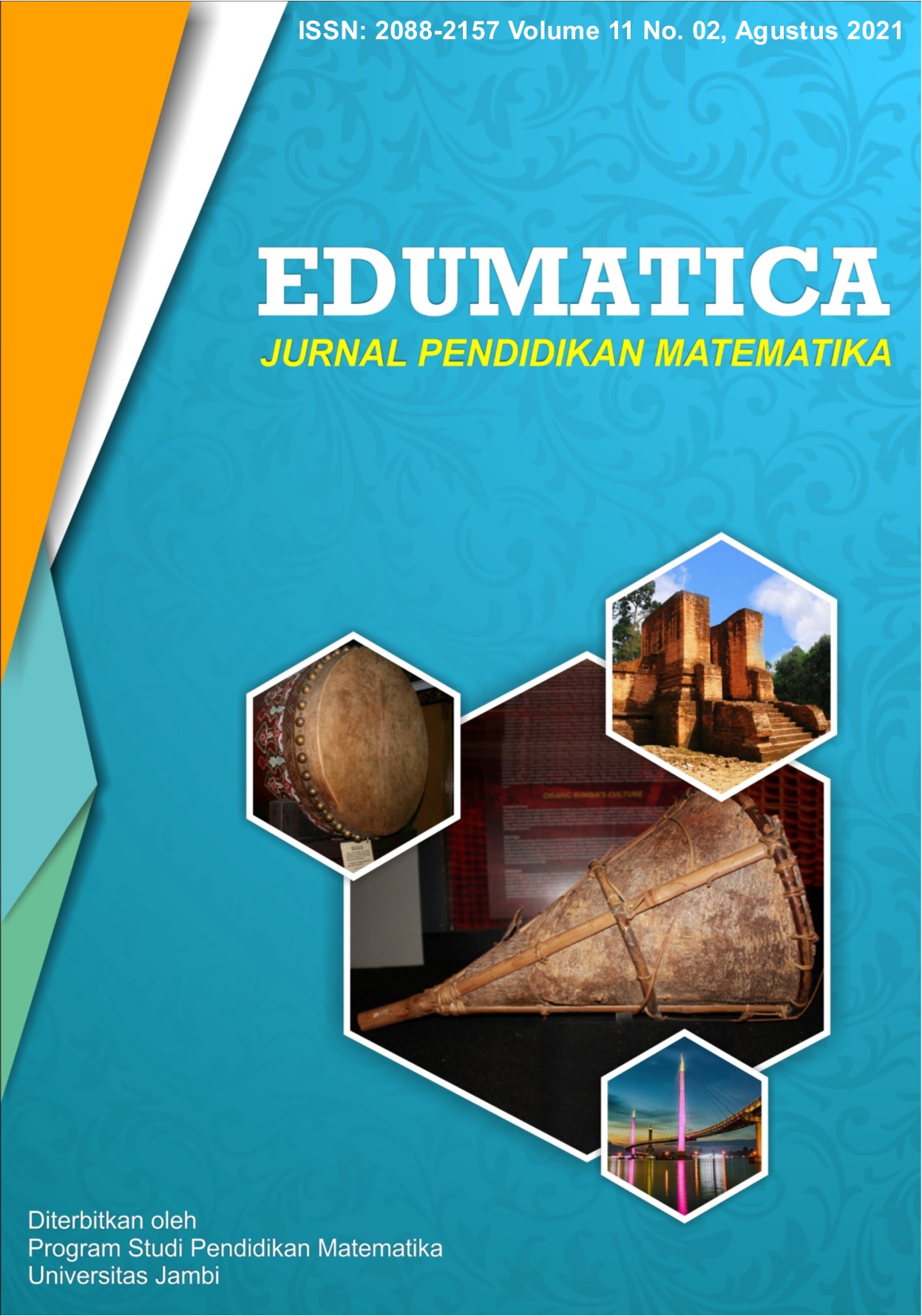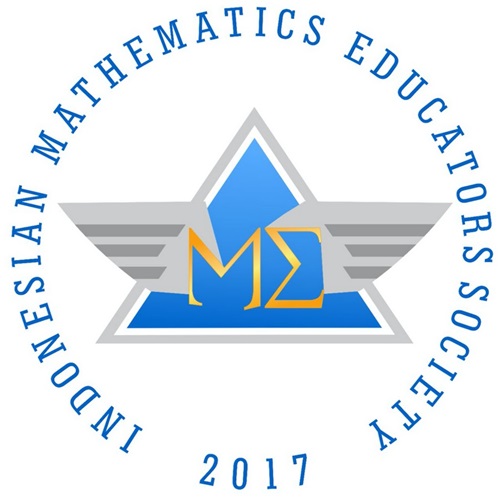Teachers' Readiness in Developing STEM-based Module to Support Teaching and Learning in the 21st Century
DOI:
https://doi.org/10.22437/edumatica.v11i02.11720Keywords:
learning module, mathematics and science teachers, STEM approach, teachers’ readinessAbstract
Nowadays, students' expected comprehensions are not only capable in memorizing formal concepts, but also capable in constructing their knowledge in solving contextual problems. The presence of the STEM approach, which is the integration of four knowledge including Science, Technology, Engineering and Mathematics, considered as one of the appropriate innovations for students in establishing their own knowledge. However, there are several problems that occur in implementing STEM approach in learning, including the preparation for STEM learning. Hence, this study aims to investigate the readiness of teachers in Indonesia to implement STEM learning, in terms of their knowledge about STEM and experience in arranging STEM-based modules. This research was conducted online using a questionnaire which was distributed through google form. Several teachers were also interviewed to get confirmation of their answers on the google form. The subjects in this study consisted of 54 Mathematics and Science teachers in junior high school. After the data was obtained, the data were analyzed qualitatively. Based on this research, it is known that most of the teachers who participated in this study did not have adequate knowledge regarding STEM, so that teachers were struggling in developing STEM-based modules.
Downloads
References
Alfika, Z. A., Mayasari, T., & Kurniadi, E. (2019). Modul STEM Berbasis Pemecahan Masalah dengan Tema Rumah Dome. Jurnal Pendidikan Fisika, 7(1), 93. https://doi.org/10.24127/jpf.v7i1.1566
Anggraini, F. I., & Huzaifah, S. (2017). Implementasi STEM dalam Pembelajaran IPA di Sekolah Menengah Pertama. Program Studi Pendidikan Biologi Fakultas Keguruan dan Ilmu Pendidikan Universitas Sriwijaya, 1998, 722-731.
Bozkurt, A., & Özyurt, M. (2019). Investigate the Reflective Evaluations of Prospective Teacher on STEM Education, Based on Their Experiences with Planning and Implementing STEM Activities. Malaysian Online Journal of Educational Technology, 7(4), 81-97. https://doi.org/10.17220/mojet.2019.04.006
Dewi, M., Kaniawati, I., & Suwarma, I. R. (2018). Penerapan Pembelajaran Fisika Menggunakan Pendekatan STEM untuk Meningkatkan Kemampuan Memecahkan Masalah Siswa pada Materi Listrik Dinamis. Quantum: Seminar Nasional Fisika, dan Pendidikan Fisika, 0(0), 381-385. http://seminar.uad.ac.id/index.php/quantum/article/view/287
Geng, J., Jong, M. S. Y., & Chai, C. S. (2019). Hong Kong Teachers' Self-efficacy and Concerns about STEM Education. Asia-Pacific Education Researcher, 28(1), 35-45. https://doi.org/10.1007/s40299-018-0414-1
Gravemeijer, K., Stephan, M., Julie, C., Lin, F. L., & Ohtani, M. (2017). What Mathematics Education May Prepare Students for the Society of the Future? International Journal of Science and Mathematics Education, 15, 105-123. https://doi.org/10.1007/s10763-017-9814-6
Gustiani, I., Widodo, A., & Suwarma, I. R. (2017). Development and Validation of Science, Technology, Engineering and Mathematics (STEM) based Instructional Material. AIP Conference Proceedings, 1848(May). https://doi.org/10.1063/1.4983969
Hafni, R. N., Herman, T., Nurlaelah, E., & Mustikasari, L. (2020). The Importance of Science, Technology, Engineering, and Mathematics (STEM) Education to Enhance Students' Critical Thinking Skill in Facing the Industry 4.0. Journal of Physics: Conference Series, 1521(4), 0-7. https://doi.org/10.1088/1742-6596/1521/4/042040
Kan, A., & Murat, A. (2018). Investigation of Prospective Science Teachers' 21st Century Skill Competence Perceptions and Attitudes toward STEM. International Online Journal of Educational Sciences, 10(4), 251-272. https://www.iojes.net
Kristanto, Y. D., & Santoso, E. B. (2020). Towards a Mathematics Textbook for Supporting 21st Century Learning: the Student Perspective. Journal of Physics: Conference Series, 1657(1). https://doi.org/10.1088/1742-6596/1657/1/012037
Milaturrahmah, N., Mardiyana, & Pramudya, I. (2017). Science, Technology, Engineering, Mathematics (STEM) as Mathematics Learning Approach in 21st Century. AIP Conference Proceedings, 1868(August). https://doi.org/10.1063/1.4995151
Nessa, W., Hartono, Y., & Hiltrimartin, C. (2017). Pengembangan Buku Siswa Materi Jarak pada Ruang Dimensi Tiga Berbasis Science, Technology, Engineering, and Mathematics (STEM) Problem-Based Learning di Kelas X. Jurnal Elemen, 3(1), 1. https://doi.org/10.29408/jel.v3i1.273
Ni, A., Mariani, S., Prabowo, A., Semarang, U. N., Pembelajaran, M., & Based, P. (2018). Kemampuan Koneksi Matematis dan Entrepreneurship Siswa SMK dalam Model Pembelajaran Project Based Learning. Jenis pendidikan berdasarkan UU. pendidikan umum, kejuruan, akademik, Pendidikan kejuruan merupakan pendidikan menengah yang mempersiapka. November, 100-113.
Puspandari, N., & Supraman. (2018). Deskripsi Multimedia Pembelajaran Matematika Berbasis STEM untuk Meningkatkan Keterampilan Berpikir Kreatif Siswa SMA Kelas XII. Seminar Nasional Pendidikan Matematika Ahmad Dahlan, 124-130.
Ramli, N. F., & Talib, O. (2017). Can Education Institution Implement STEM? From Malaysian Teachers' View. International Journal of Academic Research in Business and Social Sciences, 7(3), 2222-6990. https://doi.org/10.6007/IJARBSS/v7-i3/2772
Retnowati, S., Riyadi, & Subanti, S. (2020). The Stem Approach: the Development of Rectangular. International Online Journal of Education and Teaching (IOJET), 7(1), 2-15.
Rosikhoh, D., Mardhiyatirrahmah, L., Abdussakir, A., Abtokhi, A., & Rofiki, I. (2019). Experienced Teachers' Perceptions: Math-Focused Steam Learning. Abjadia, 4(2), 118. https://doi.org/10.18860/abj.v4i2.8123
Setiawaty, S., Imanda, R., Fitriani, H., & Sari, P. (2019). Pengembangan LKS Sains Berbasis STEM untuk Siswa Sekolah Dasar. Pengembangan LKS Sains Berbasis STEM untuk Siswa Sekolah Dasar, 1, 485-490.
Shernoff, D. J., Sinha, S., Bressler, D. M., & Ginsburg, L. (2017). Assessing Teacher Education and Professional Development Needs for the Implementation of Integrated Approaches to STEM Education. International Journal of STEM Education, 4(1), 1-16. https://doi.org/10.1186/s40594-017-0068-1
Susilo, H., & Sudrajat, A., K. (2020). STEM Learning and its Barrier in Schools: the Case of Biology Teachers in Malang City. Journal of Physics: Conference Series, Vol. 1563,(1), 012042. https://doi.org/10.1088/1742-6596/1563/1/012042
Teo, P. (2019). Teaching for the 21st Century: a Case for Dialogic Pedagogy. Learning, Culture and Social Interaction, 21 (March), 170-178. https://doi.org/10.1016/j.lcsi.2019.03.009
Tofel-Grehl, C., & Callahan, C. M. (2014). STEM High School Communities: Common and Differing Features. Journal of Advanced Academics, 25(3), 237-271. https://doi.org/10.1177/1932202X14539156
Utami, T. N., Jatmiko, A., & Suherman, S. (2018). Pengembangan Modul Matematika dengan Pendekatan Science, Technology, Engineering, and Mathematics (STEM) pada Materi Segiempat. Desimal: Jurnal Matematika, 1(2), 165. https://doi.org/10.24042/djm.v1i2.2388
Winangun, M. M., & Kurniawan, D. (2019). The Barriers of School Using Subject Design Curriculum in Implementing STEM Education: Perspectives of Science Teacher. ACM International Conference Proceeding Series, 66-70. https://doi.org/10.1145/3341042.3341053
Downloads
Published
How to Cite
Issue
Section
License
Copyright (c) 2021 Nana Diana, Turmudi Turmudi

This work is licensed under a Creative Commons Attribution-NonCommercial-ShareAlike 4.0 International License.







